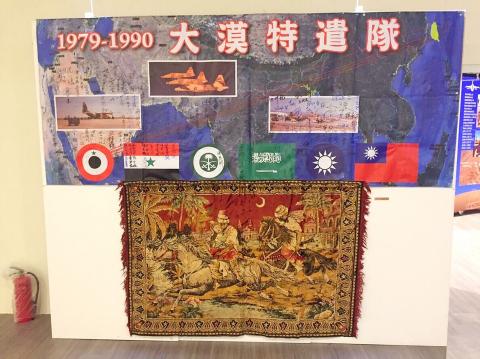A secret military mission to Yemen by the air force is commemorated with a special exhibition at the Air Force Museum that opened on Saturday, 40 years after Taiwanese troops were deployed to help North Yemen forces.
The now declassified military aid program, which the air force conducted from 1979 until 1990, began with a request from then-diplomatic ally Saudi Arabia to aid its ally, the Yemen Arab Republic, which had no ties with Taiwan, a Ministry of National Defense official said, speaking on condition of anonymity.
North Yemen at the time was engaged in a rivalry with the People’s Democratic Republic of Yemen, which it fought during a brief war in 1972.

Photo courtesy of the Republic of China Air Force Museum
The countries in 1990 formed the Republic of Yemen, but strife returned to the region in 2017.
The air force denies ever flying any combat missions over Yemen.
In what was known as the Great Desert Program (大漠計畫), the air force deployed more than 1,000 personnel — including pilots and ground crew — to assist and advise the North Yemeni air force, until Saudi Arabia withdrew its diplomatic recognition of Taiwan, ending the program, the official said.
Many participants in the program would rise to prominent military and civilian positions, including Deputy Minister of National Defense Shen Yi-ming (沈一鳴) and former Civil Aeronautics Administration director-general Billy Chang (張國政), the official said.
The exhibition features records and documents, as well as uniforms, insignia and photographs from 200 veterans who participated in the mission, the official said.
On the opening day, the Air Force Academy presented a commendation of gratitude to personnel involved in the mission on behalf of the armed forces.

Taiwan has received more than US$70 million in royalties as of the end of last year from developing the F-16V jet as countries worldwide purchase or upgrade to this popular model, government and military officials said on Saturday. Taiwan funded the development of the F-16V jet and ended up the sole investor as other countries withdrew from the program. Now the F-16V is increasingly popular and countries must pay Taiwan a percentage in royalties when they purchase new F-16V aircraft or upgrade older F-16 models. The next five years are expected to be the peak for these royalties, with Taiwan potentially earning

STAY IN YOUR LANE: As the US and Israel attack Iran, the ministry has warned China not to overstep by including Taiwanese citizens in its evacuation orders The Ministry of Foreign Affairs (MOFA) yesterday rebuked a statement by China’s embassy in Israel that it would evacuate Taiwanese holders of Chinese travel documents from Israel amid the latter’s escalating conflict with Iran. Tensions have risen across the Middle East in the wake of US and Israeli airstrikes on Iran beginning Saturday. China subsequently issued an evacuation notice for its citizens. In a news release, the Chinese embassy in Israel said holders of “Taiwan compatriot permits (台胞證)” issued to Taiwanese nationals by Chinese authorities for travel to China — could register for evacuation to Egypt. In Taipei, the ministry yesterday said Taiwan

Taiwan is awaiting official notification from the US regarding the status of the Agreement on Reciprocal Trade (ART) after the US Supreme Court ruled US President Donald Trump's global tariffs unconstitutional. Speaking to reporters before a legislative hearing today, Premier Cho Jung-tai (卓榮泰) said that Taiwan's negotiation team remains focused on ensuring that the bilateral trade deal remains intact despite the legal challenge to Trump's tariff policy. "The US has pledged to notify its trade partners once the subsequent administrative and legal processes are finalized, and that certainly includes Taiwan," Cho said when asked about opposition parties’ doubts that the ART was

If China chose to invade Taiwan tomorrow, it would only have to sever three undersea fiber-optic cable clusters to cause a data blackout, Jason Hsu (許毓仁), a senior fellow at the Hudson Institute and former Chinese Nationalist Party (KMT) legislator, told a US security panel yesterday. In a Taiwan contingency, cable disruption would be one of the earliest preinvasion actions and the signal that escalation had begun, he said, adding that Taiwan’s current cable repair capabilities are insufficient. The US-China Economic and Security Review Commission (USCC) yesterday held a hearing on US-China Competition Under the Sea, with Hsu speaking on